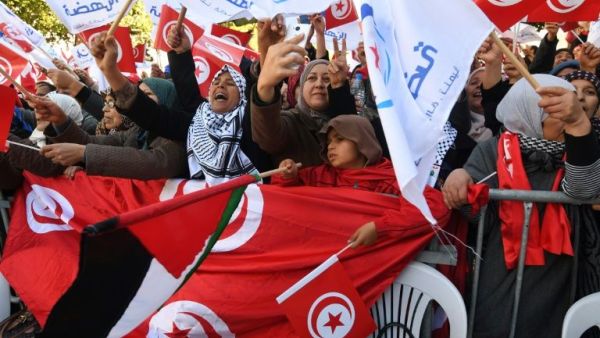Tunisia’s Ennahda Movement, which enjoys a parliamentary majority, has called on forming an extended government that takes into consideration the parliamentary representation.
However, it didn’t rule out holding new parliamentary elections if efforts to form this government failed.
Chairman of Ennahda Movement's Shura Council Abdelkarim Harouni said the party's executive office has recommended being prepared for all possibilities following Habib Jemli government’s failure to gain the parliament’s vote of confidence.
Tunisia's PM-designate Elyes Fakhfakh was chosen to replace Jemli in the government formation, scheduled for Feb. 20.
Harouni said negotiations on the government formation have just started and called on Fakhfakh to expand consultations with all parliamentary blocs.
The government comprising the country’s four major parties (Ennahda Movement, the Democratic Current party, People Popular Movement, and Long Live Tounes (Tahya Tounes), is no longer effective and is difficult to succeed, Harouni noted, explaining that if only two of these parties disagree on opinions or views, the government will fall.
He slammed the government description given by the People Popular Movement, which said it is the “president’s government,” and stressed that the next government is the people’s.
The country’s Parliament Speaker Rached Ghannouchi stressed during his meeting with Fakhfakh the importance of forming the next government in accordance with the parties’ parliamentary representation, which means that he assigning to his party the largest number of ministerial portfolios.
He pointed out that Ennahda doesn’t object neutralizing the ministries of interior, defense, and justice and appointing independent figures to head them.
Ennahda has won the most votes during the October 6 elections, with 52 parliamentary seats. Qalb Tounes (Heart of Tunisia) won 38 seats, the Democratic Current party came third with 22 seats, and People Popular Movement fourth with 15 seats, while Long Live Tounes won only 14 seats.
Ennahda’s Shura Council held its session on Sunday and called for “expanding consultations to include the various parliamentary blocs in order to provide a broad political belt,” as stated in the text of the mandate issued by Tebboune.
This would ensure the formation of a government of national unity with social and democratic content, it said.
The Council also called for the speedy completion of the constitutional institutions, foremost of which is the Constitutional Court.
This article has been adapted from its original source.








